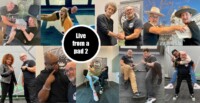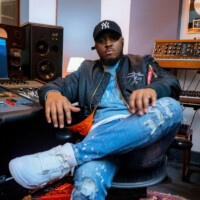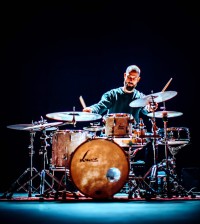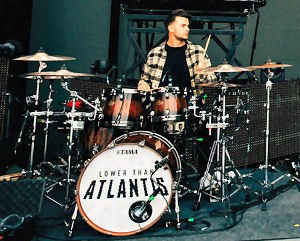 Over the years Lower Than Atlantis have made some big changes in their musical direction. But on the long journey from punk-rock to rock-pop, one thing never changed: the powerful drumming and solid grooves behind the band. Eddy Thrower has created his very own approach to playing rock music and has become an in demand drummer far beyond the borders of Lower Than Atlantis.
Over the years Lower Than Atlantis have made some big changes in their musical direction. But on the long journey from punk-rock to rock-pop, one thing never changed: the powerful drumming and solid grooves behind the band. Eddy Thrower has created his very own approach to playing rock music and has become an in demand drummer far beyond the borders of Lower Than Atlantis.
I caught up with Eddy at this years London Drum Show to chat about his work with the band, his musical journey over the years and his work in the session scene.
Tell me about your band Lower Than Atlantis. You weren’t a member at the beginning, so how did it come about?
When LTA first started out they had about 50 members, there were always people coming in and out. Me and Dec (the bass player) are from Winchester where we used to play in a metal band and to cut a long story short, we played a gig with LTA. Mike and Ben, the two founding members saw me play and when their drummer left they sent me a message and asked if I wanted to come and audition. I was at Uni at that time and spent my days delivering curry, Chinese and pizza, so of course I wanted to audition. That’s when LTA became a more serious and full time thing.
So you’ve always been in the rock/metal genre?
Yeah, it was kind of that thing at that time: everyone was in a metal or rock band. It was fun! A lot of double bass stuff, that kind of thing.
You were 19 when you joined the band. What was your journey before that?
I went to uni doing music journalism and it was just a complete waste of my time. I wasn’t into it and all I wanted to do was play drums. I wanted to do something related to music, so I thought I’d study music journalism because it’s serious but I could get away with doing nothing. I went for about two months but the icing on the cake was when I went to a lecture about bands and they were lecturing things like: “This is a band called Black Sabbath, they created heavy music” and everyone in the room was writing it down in their notes. I just thought if you don’t know that, you’re definitely in the wrong game so I left there and then.
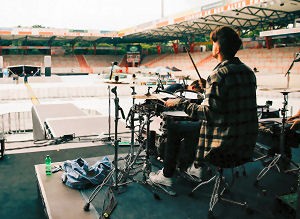 In the early stages, the band’s musical direction changed quite a bit. Was it the band that changed and then your playing; or did your playing evolve and thereby change the bands direction?
In the early stages, the band’s musical direction changed quite a bit. Was it the band that changed and then your playing; or did your playing evolve and thereby change the bands direction?
Yes, the playing evolved massively! I think it got to the point where just none of us listened to that sort of music. We still appreciate it now but I don’t listen to heavy music at all. I think if you can predict what a band’s gonna do, it’s not worth doing. You have to change a little bit to keep it interesting and I think especially LTA have done that on every album. It sounds really cliché but for us it was just a natural progression, we didn’t think about it. Especially on the last album: if it was rock, indie, pop, metal, whatever – if it was good, it stuck. That was it, we didn’t label it and it worked out well and for the better.
How did your drumming change as a result of all of this?
I got rid off the double pedal, I started doing a lot more linear stuff, got heavily into the gospel and pop world and started to appreciate not what you play but how you play it. I mean, when you hear a drummer you can tell within five seconds if he’s good or not by hearing him just play a 4/4 groove. I’m not even old, I just turned 25, but I’m kind of already passed the getting on a kit and shedding out with lots of chops. I just appreciate a standard 4/4 beat played with feel and confidence.
Who influenced your drumming over the years?
It completely changed all the time because I get bored of everything and anything straight away. When I started out it was Lars Ulrich from Metallica, they were my favourite band and got me into heavy music and gave me the passion to play live. It’s funny because Lars isn’t that boss at all. I don’t even care if you print that or not [laughs]. He got me into drums though. I love the way he always played the crash on two and four, it was kind of his signature thing. I still use that now and thats down to him.
Obviously also people like Travis Barker. Now it’s more of the gospel guys like Chris Coleman, Aaron Spears, Tony Royster jr and Eric Moore. But I take a lot of inspiration from just music in general. I just listen to anything. I’ve never been like: I love this and this drummer. I just love accessible music straight away. When people ask me what music I like I just say: I like music. I take a lot of inspiration from vocal melodies, hooks, anything and everything. Not necessarily a drummer.
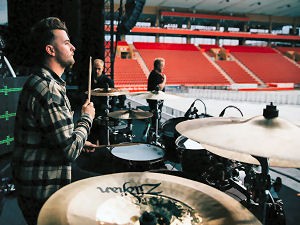 The band took a little hiatus back in 2013 and I read there were some thoughts of giving up?
The band took a little hiatus back in 2013 and I read there were some thoughts of giving up?
Yeah, that was a strange time. We were signed to Island records and got pressured into doing an album quickly and we weren’t happy with it, but when you get signed to a major label and you’re that age as well as a rock band, without knowing you think you’re untouchable. Everyone around you is telling you what to do and we were just being naive at the time. We had this album and everyone who worked for us was saying it was amazing, but we kind of knew it wasn’t. It didn’t do as well as we thought and then Island said: we’ll give you your advance but you can stay on or you can leave. We went: “Wait, so you’ll give us our advance but we can go?”. So we took the money and left and it worked out great. Now we’re with Sony and it’s amazing and they understand us and how we work.
Again, it sounds so cliché but we learned so much really quickly and just said to ourselves that we would do everything on our terms: when we want and how we want – and we had just got our own studio then. We didn’t have to hire out places to write and record and we could start working with different producers. It just went back to a ‘making music with your mates’ and we didn’t really care about the outcome. It just came very natural and most of all it was fun, but also challenging. We all had a fresh new outlook on writing music and creating an album and we learnt a lot really quickly.
Our biggest selling and most successful song today is ‘Here We Go’, That was written in one day, recorded at our studio the next day and sent to the radio on the third day.
What did the bands break do for your drumming career?
It was weird because at that moment in time we were writing for the next album, and through that I met all these producers and songwriters. That’s when I started doing session work. I did some recordings for 5 Seconds Of Summer, One Direction, did lots of stuff for films, and recorded for some other artists too. So for me it was a blessing in disguise because I got my foot in the door in that world.
So I wasn’t sitting at home wondering what to do. If anything, that was a really busy time for me and all of us individually as well. We all became extremely hard working and passionate to achieve what we wanted to achieve, in and out of the band. We had a collective goal, which was to create the best album we could but we also had separate goals as well within the industry, whether it be song writing, session playing, recording, mixing. We are always busy and have our heads down.
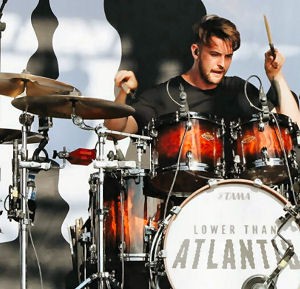 You’ve already mentioned you recorded the new album by yourself and I read you recorded cymbals and drums separately?
You’ve already mentioned you recorded the new album by yourself and I read you recorded cymbals and drums separately?
Yeah, we did that on some of the tracks and for most of the choruses. It sucks. It sucks so bad! [laughs]
It depends on what kind of style you’re playing but for me there are ghost notes all over the place and it’s very free and dynamic. It makes sense if you’re a very static drummer, but when you take something very groovy that has lots of dynamics into it and you take away the cymbals, you’re kind of left with nothing and it just sounds horrible. That’s why it works for choruses, especially simple choruses. It does sounds big doing it this way and I know why the producers do it, but for a drummer it does take away that special feel, but its worth it for the bigger picture. You’ve just gotta do what your producer wants and needs. For me, thats when you learn the most. In environments where you aren’t that comfortable but you have no other option than just to do it, and to to do it well!
How does that effect the vibe of the song?
It completely kills it, it’s horrible. I’ve done it a few times now, done it for the One Direction stuff as well. If the producer wants it, you just have to do it. It’s a good learning curve, doing things that you don’t wanna do.
I found something interesting in your set-up: rock band and woodblock? How did that come about?
Yeah, this is like my trademark thing now apparently. It started off years and years ago. I found this cowbell hidden away in our practise space somewhere and I thought I’d bring it on the tour to count in songs. We didn’t play to click back then so I started using it to count in a few songs. It gradually started working its way into writing, then recording and now it’s really important. On tour in Australia recently I thought it was broken and it was so more important than a tom. I had to have it as its such a staple in what I do now.
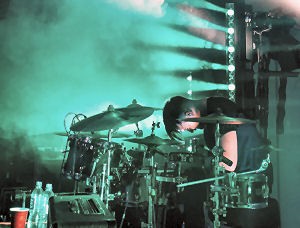 You’re using it within fills as well. Do you kind of treat it as an extra tom?
You’re using it within fills as well. Do you kind of treat it as an extra tom?
Yes, it’s kind of like a tom. I use it more as an accent tool. I love it. It just blows the mind of everyone who hasn’t seen us before.
As you mentioned it, do you guys now play to track?
Yes, I love it. Obviously we grew up in the punk rock scene where it’s frowned upon really, but when we started touring with lots of metal bands, they ran their whole show on click. They press play in the beginning and there is one track running through till the end of the show. It was just really attractive and for me really professional. I can appreciate both sides of the argument when it comes to using a click track live. In some cases depending on who you’re playing for, it might not work, in that case I’d happily not use one and still be playing the same. But for LTA and how our set runs and how we like to play live (no count ins, tracks blending in to one another) it works well. It’s always nice to play around with new ways of playing, sometimes in our studio when I’m practicing I’ll put on John Mayer and sit back on the groove, no click, no fills, and enjoy it just as much as going crazy over a click.
Tell me a bit more about your session work. How did that come about?
I did the One Direction stuff first. We worked with a producer who did a lot of their tracks, we demo-ed a song with him and he liked my playing. It was one of those things: I emailed him after we worked on the LTA stuff together saying “Good working with you. I’m about if you need anything”; didn’t expect anything ever; and about a month later he emailed me out of the blue to record one of their tracks. For 5 Seconds Of Summer, I recorded their massive single ‘Don’t Stop’ from their old album and then did three more songs for them. The film stuff I did was also for another producer friend of mine.
How does the session side of things compare to the band work?
It is amazing being part of something that you have created and LTA is my life, its the best. I believe though you should just do anything and everything: do every genre, do session work, be in a band. There is no reason not to. Whenever you play drums and music, it’s amazing! You could be stocking shelves in Asda – no offence to people who are working in Asda [laughs]. You know what I mean though. If you’re in a band or you’re doing session work – both are amazing – but always try doing the opposite as well. Try to always achieve it all.
Things like Twitter, Facebook and Instagram make everything so easy. For example, I’ve been chatting to Kaz Rodriguez for ages, we’ve spoken on the phone a loads of times, we even pretty much booked in a session together but today was the first time I met him face to face. With the internet today you can just do anything and everyone should be utilising it and socialising. One of the best things I did when I started to play drums was make a band, even though we were awful! Looking back it was so important to learn to play with other musicians straight away. To understand the importance of groove, timing and dynamics. But most of all, realise how fun it was and how nothing else could come close to that feeling. I urge all my students to get use social media and find a band to join. Theres nothing better than playing music with your mates, covering your favourite bands songs and making noise. You’ll learn a lot more than you think without realising, trust me. Have fun!
You could be the greatest drummer in the world, but if no one knows you or no one knows about you, who are they going to pick for a job? The greatest drummer in the world sat in his bedroom or the good drummer who is out networking and meeting people? It’s important to be amazing at your craft, but also just be a nice person and a sociable one at that.
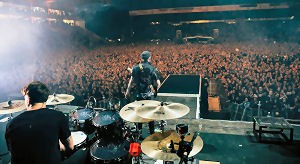 Did being in Lower Than Atlantis help you into the session world?
Did being in Lower Than Atlantis help you into the session world?
Yeah, I mean…. This is gonna sound well arrogant but obviously you have to be good anyway. There are a lot of people who play in bands who are really rubbish. I’m not scared to say that because everyone knows it! There are a lot of bands out there who are headlining the biggest venues in the world, doing this, that and the other and their drummer can barely even play. But yeah, being in a band obviously helped because it put me on the platform for people to see. I know it sounds obvious but you just really have to be good at what you do and try not to be like everyone else. Try to be unique and find what makes you. For example, don’t set up your kit like Travis Barker and try to mirror how he plays, because there already is a Travis Barker. And no one is going to be better at being him than himself. The session world is a difficult place to be recognised, theres a lot of amazingly talented drummers out there, all doing amazing things all the time. It’s not easy, especially within the session world. People have spent their lives perfecting what they do and trying to be the best at it and so should everyone else. Its such a positive and productive game to be in. I love it. Constantly pushing yourself and working hard, perfecting what you do. Making your own future (as cliched as that sounds, its true) no ones going to practice for you.
I just love drums mate, I could talk about them all day long!
And finally, what’s next?
We’ve just done Australia and America, we have a week and a half off, then we go on our biggest headline run around the UK. We’re also doing the Roundhouse in London which should be cool. We have a few other one-off’s here and there and that’s it for the year. We just done our fourth live lounge, pretty much a residency at Radio 1 [laughs]. It’s been a mental year. Also we just released the re-issue of our album which is on B-list on Radio 1 with is pretty cool. I do have some session work coming up too, recording some film stuff. Besides all that I also give lessons when time allows. There’s more info on that on my website.
But yeah, mainly finishing off the tour and then that’s me done for Christmas. After Christmas I’ll be doing a run of clinics which I can’t wait for!
Interview Tobias Miorin
December 2015

